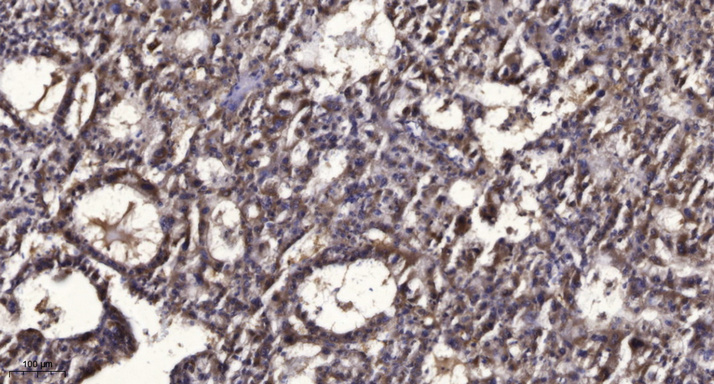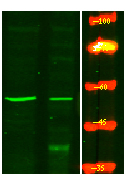PPAR α (Phospho Ser21) rabbit pAb
- Catalog No.:YP1576
- Applications:WB;IHC
- Reactivity:Human;Rat;Mouse;
- Target:
- PPAR α
- Fields:
- >>PPAR signaling pathway;>>cAMP signaling pathway;>>Adipocytokine signaling pathway;>>Glucagon signaling pathway;>>Insulin resistance;>>Non-alcoholic fatty liver disease;>>Alcoholic liver disease;>>Hepatitis C;>>Chemical carcinogenesis - receptor activation;>>Diabetic cardiomyopathy
- Gene Name:
- PPARA NR1C1 PPAR
- Protein Name:
- PPAR α (Phospho Ser21)
- Human Gene Id:
- 5465
- Human Swiss Prot No:
- Q07869
- Mouse Gene Id:
- 19013
- Mouse Swiss Prot No:
- P23204
- Rat Gene Id:
- 25747
- Rat Swiss Prot No:
- P37230
- Immunogen:
- Synthesized peptide derived from human PPAR α (Phospho Ser21)
- Specificity:
- This antibody detects endogenous levels of Human PPAR α (Phospho Ser21)
- Formulation:
- Liquid in PBS containing 50% glycerol, 0.5% BSA and 0.02% sodium azide.
- Source:
- Polyclonal, Rabbit,IgG
- Dilution:
- WB 1:500-2000;IHC 1:50-300
- Purification:
- The antibody was affinity-purified from rabbit serum by affinity-chromatography using specific immunogen.
- Concentration:
- 1 mg/ml
- Storage Stability:
- -15°C to -25°C/1 year(Do not lower than -25°C)
- Other Name:
- Peroxisome proliferator-activated receptor alpha (PPAR-alpha;Nuclear receptor subfamily 1 group C member 1)
- Observed Band(KD):
- 52kD
- Background:
- function:Receptor that binds peroxisome proliferators such as hypolipidemic drugs and fatty acids. Once activated by a ligand, the receptor binds to a promoter element in the gene for acyl-CoA oxidase and activates its transcription. It therefore controls the peroxisomal beta-oxidation pathway of fatty acids.,online information:Peroxisome proliferator-activated receptor entry,similarity:Belongs to the nuclear hormone receptor family. NR1 subfamily.,similarity:Contains 1 nuclear receptor DNA-binding domain.,subunit:Heterodimer with the retinoid X receptor. Interacts with NCOA3 and NCOA6 coactivators, leading to a strong increase of transcription of target genes. Also interacts with PPARBP coactivator in vitro. Interacts with AKAP13.,tissue specificity:Skeletal muscle, liver, heart and kidney.,
- Function:
- negative regulation of transcription from RNA polymerase II promoter, response to hypoxia, circulatory system process, transcription, transcription, DNA-dependent, regulation of transcription, DNA-dependent, regulation of transcription from RNA polymerase II promoter, transcription from RNA polymerase II promoter, fatty acid metabolic process, lipid transport, ectoderm development, blood circulation, regulation of blood pressure, epidermis development, response to wounding, response to endogenous stimulus, response to hormone stimulus, negative regulation of biosynthetic process, positive regulation of biosynthetic process, regulation of catabolic process, positive regulation of catabolic process, response to extracellular stimulus, response to organic substance, regulation of specific transcription from RNA polymerase II promoter, negative regulation of specific transcription from RNA p
- Subcellular Location:
- Nucleus.
- Expression:
- Skeletal muscle, liver, heart and kidney. Expressed in monocytes (PubMed:28167758).
- June 19-2018
- WESTERN IMMUNOBLOTTING PROTOCOL
- June 19-2018
- IMMUNOHISTOCHEMISTRY-PARAFFIN PROTOCOL
- June 19-2018
- IMMUNOFLUORESCENCE PROTOCOL
- September 08-2020
- FLOW-CYTOMEYRT-PROTOCOL
- May 20-2022
- Cell-Based ELISA│解您多样本WB检测之困扰
- July 13-2018
- CELL-BASED-ELISA-PROTOCOL-FOR-ACETYL-PROTEIN
- July 13-2018
- CELL-BASED-ELISA-PROTOCOL-FOR-PHOSPHO-PROTEIN
- July 13-2018
- Antibody-FAQs
- Products Images

- Immunohistochemical analysis of paraffin-embedded human liver cancer. 1, Antibody was diluted at 1:200(4° overnight). 2, Tris-EDTA,pH9.0 was used for antigen retrieval. 3,Secondary antibody was diluted at 1:200(room temperature, 45min).

- Western Blot analysis of Hela treated or untreated by LPS lysis, using primary antibody at 1:1000 dilution. Secondary antibody(catalog#:RS23920) was diluted at 1:10000


